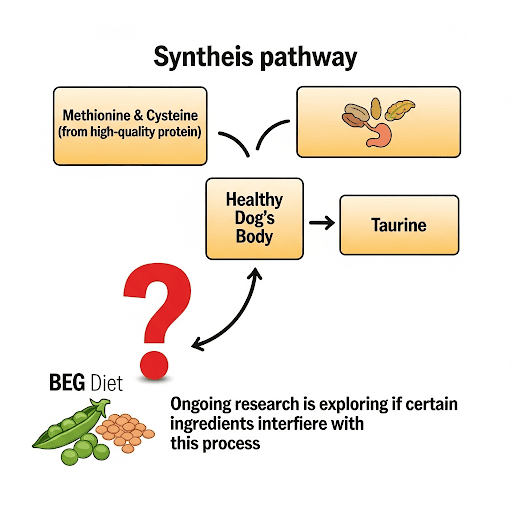Here is a foundational fact of pet nutrition: taurine is an absolutely essential amino acid for cats. A diet deficient in taurine can cause them to go blind and develop severe heart failure. For dogs, however, the story has always been different… until recently.
Over the past several years, the veterinary community has been investigating a concerning link between certain types of diets and a serious heart condition in dogs called dilated cardiomyopathy (DCM). This investigation has placed a spotlight on taurine, forcing nutritionists and pet parents alike to ask a critical question: is taurine a necessary supplement for dogs?
This article will explain what taurine is, why dogs are not supposed to need it from their diet, and what the current science says about supplementation in light of the diet-associated DCM in dogs concerns.
What is Taurine and Why is it Different for Dogs?
Taurine is a unique amino acid that is vital for several critical bodily functions. It is essential for:
- The health and function of the heart muscle (myocardium).
- The development and health of the retina in the eye.
- The production of bile salts, which are necessary for digesting fats.
- The proper functioning of the central nervous system.
Here’s the key difference between cats and dogs: Cats are obligate carnivores that cannot produce their own taurine. They must consume it directly from animal tissues in their diet.
Dogs, on the other hand, have the metabolic ability to synthesize their own taurine from two other amino acids found in protein: methionine and cysteine. Because of this built-in production capability, taurine has not been considered a dietarily essential amino acid for dogs. The long-held understanding was that as long as a dog's diet contained sufficient high-quality protein (with plenty of methionine and cysteine), their body could make all the taurine it needed.
The Link to Diet-Associated DCM
In 2018, the U.S. Food and Drug Administration (FDA) announced it was investigating an increase in reports of non-hereditary dilated cardiomyopathy (DCM) in dogs. DCM is a disease of the heart muscle that results in an enlarged heart and diminished pumping ability, which can lead to congestive heart failure.
The investigation found that many of the affected dogs were eating diets that fell into a category often called "BEG" (Boutique companies, Exotic ingredients, Grain-free). Many of these formulas contained high levels of peas, lentils, other legumes, or potatoes as primary ingredients. The hypothesis that emerged was that something about these grain-free diets and heart disease risk was connected.
One leading theory involves taurine. It's possible that some of these ingredients may interfere with a dog's ability to absorb or synthesize taurine, or that the plant-based proteins used simply don't provide enough of the methionine and cysteine building blocks. Indeed, some of the dogs diagnosed with diet-associated DCM had low taurine levels and their heart function improved dramatically with taurine supplementation.
However, the issue is complex. Not all dogs with diet-associated DCM have low taurine levels, and not all dogs on BEG diets develop problems. The link is not yet fully understood and is likely a multi-factorial issue involving ingredients, processing, and individual genetic predispositions.
The ongoing DCM investigation highlights the importance of choosing diets from well-established manufacturers who conduct extensive research and feeding trials. Our meal planner app prioritizes foods from reputable brands that invest in nutritional science, helping you navigate these complex issues with confidence.
So, Should I Give My Dog a Taurine Supplement?
This is the question on every concerned dog owner's mind. Based on current veterinary guidance, here is a prudent approach:
- For most dogs eating a traditional, grain-inclusive diet from a well-established, reputable manufacturer, routine taurine supplementation is likely unnecessary.
- If you are feeding a BEG diet, the safest and most conservative recommendation from veterinary cardiologists is to discuss switching to a diet that meets the guidelines of the World Small Animal Veterinary Association (WSAVA). These are typically foods made by long-standing companies that conduct rigorous research and feeding trials.
- If you must feed a BEG diet for a specific reason (like a confirmed food allergy), having a conversation with your vet about the potential benefits of adding a taurine for dogs supplement is a reasonable precaution.
- For at-risk breeds that have a genetic predisposition to DCM (like Doberman Pinschers, Great Danes, and Cocker Spaniels), discussing both diet and supplementation with your veterinarian is always a wise strategy.
The Golden Rule: Never make these changes in a vacuum. Always consult with your veterinarian. They can assess your dog's individual health, diet, and risk factors to help you make the most informed decision.
(The DCM issue often involves grain-free diets. To understand them better, read our article [Is Grain-Free Kibble Better for My Pet?].)

Conclusion: A Prudent Approach to Heart Health
Taurine is undeniably a vital nutrient for canine heart health. While most dogs are equipped to make their own, the concerns surrounding diet-associated DCM have taught us that this process can be more fragile than we once thought. The link between certain diets and heart health is a serious and evolving area of nutritional science.
The most prudent approach for pet parents is to favor diets made by companies who prioritize scientific research and quality control over marketing trends.
Your pet's heart health is too important for guesswork. If you have any concerns about your dog's diet, their risk for DCM, or the question of taurine supplementation, please have an open and honest conversation with your veterinarian. They are your best and most reliable resource for navigating this complex topic and making the safest choice for your beloved companion.


